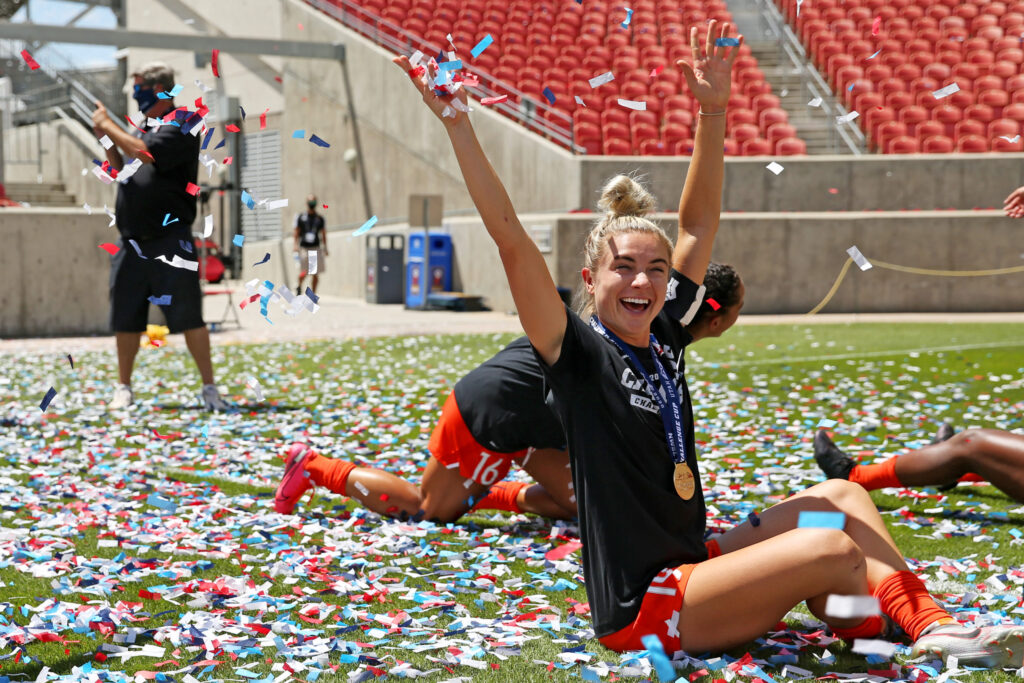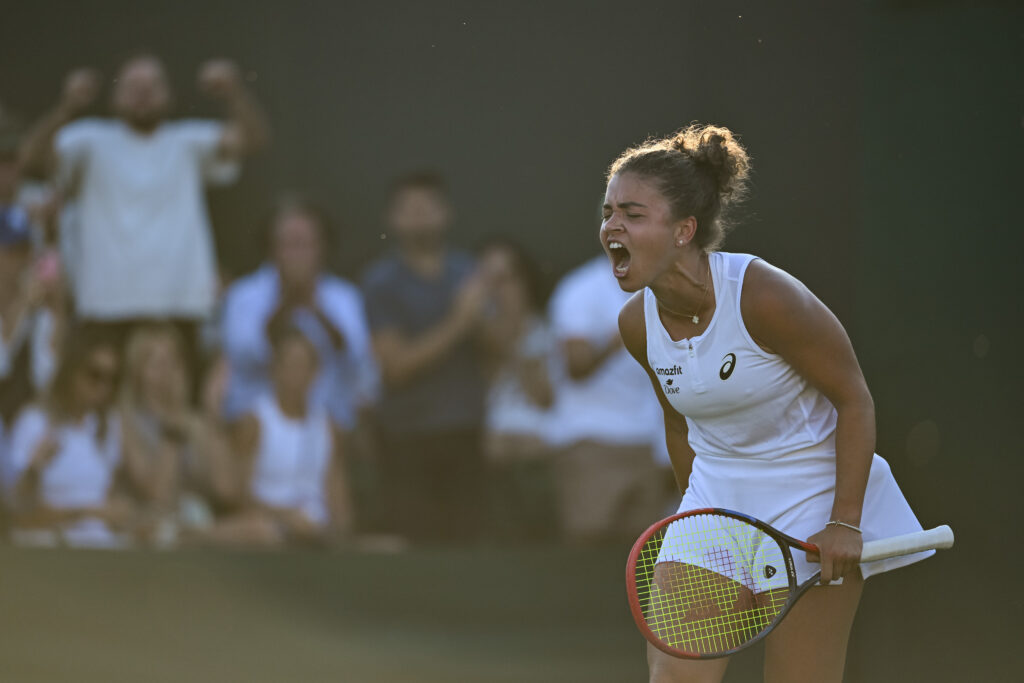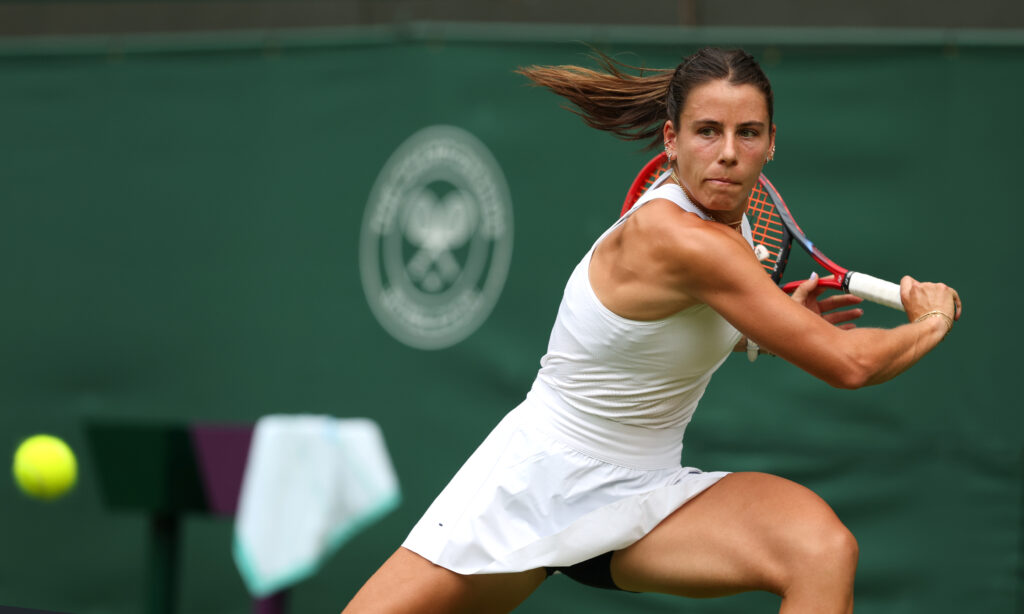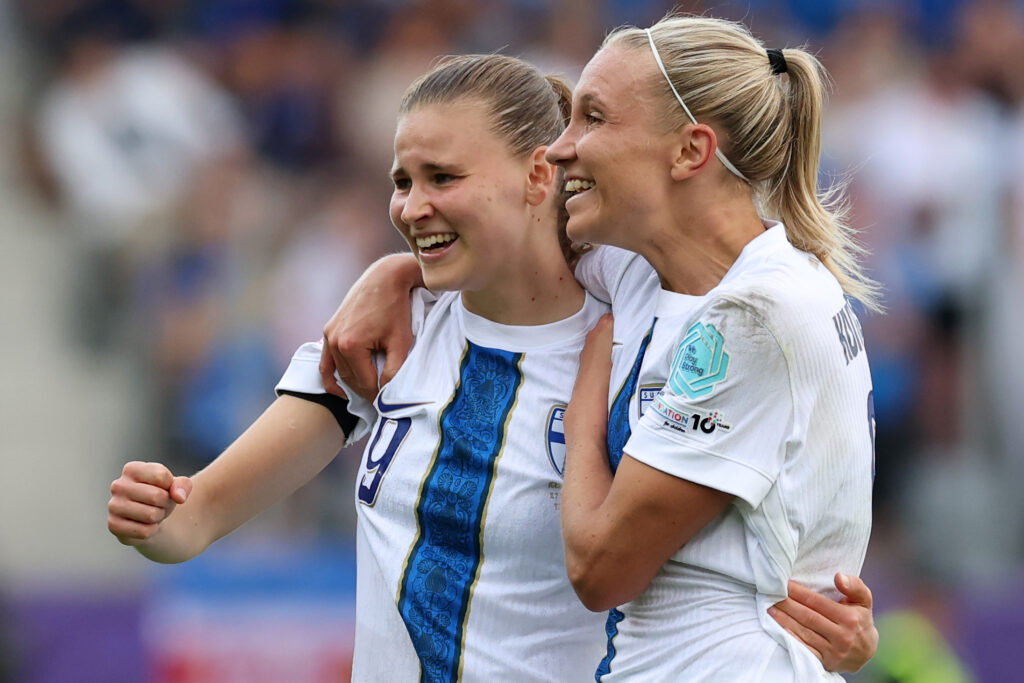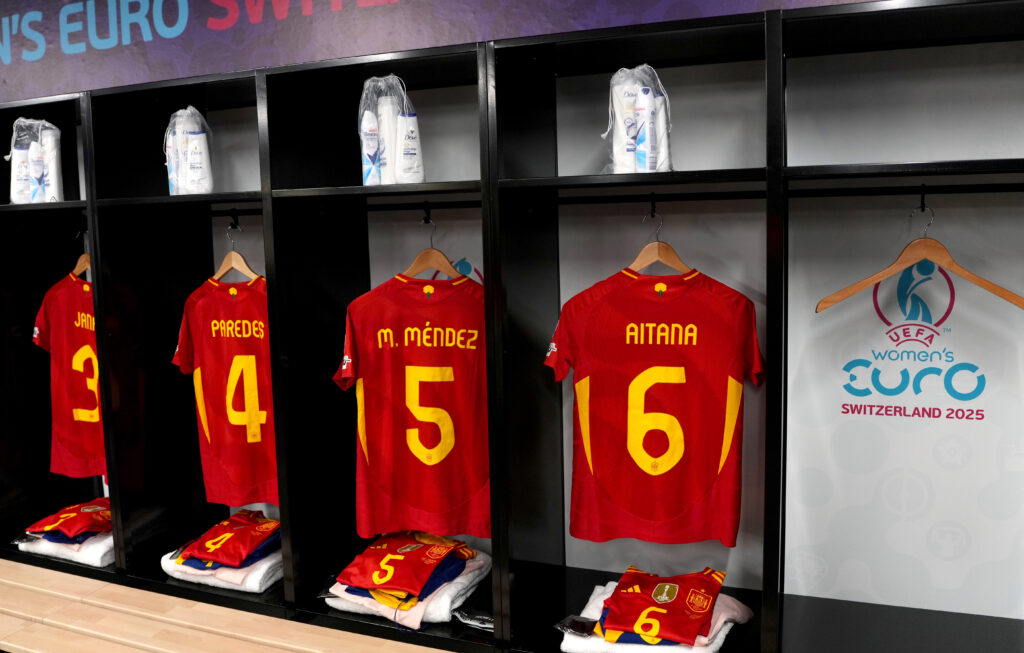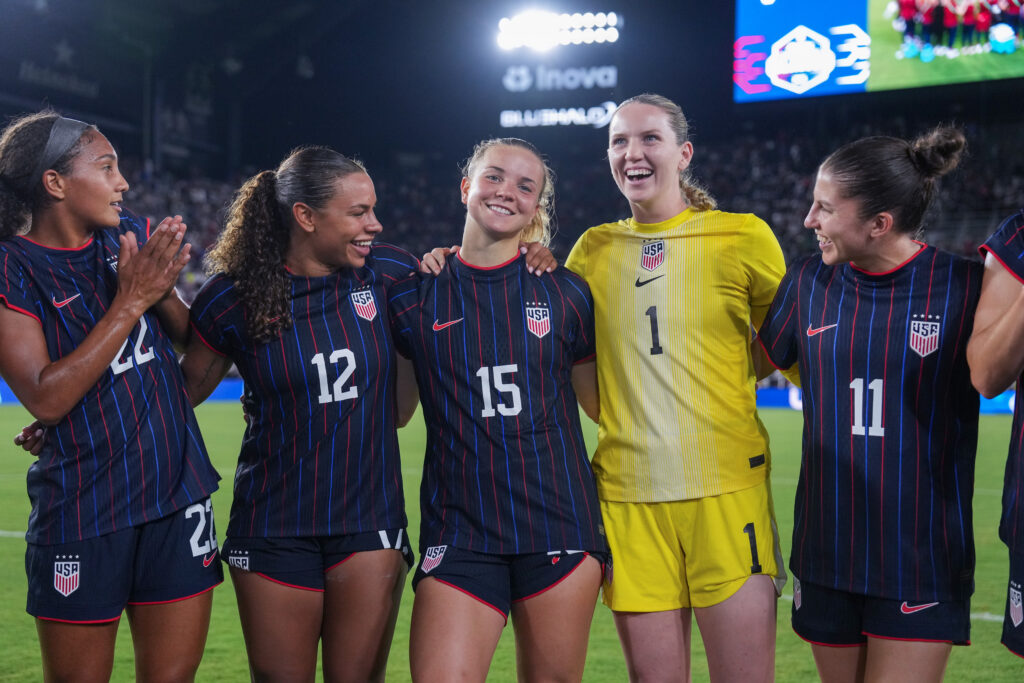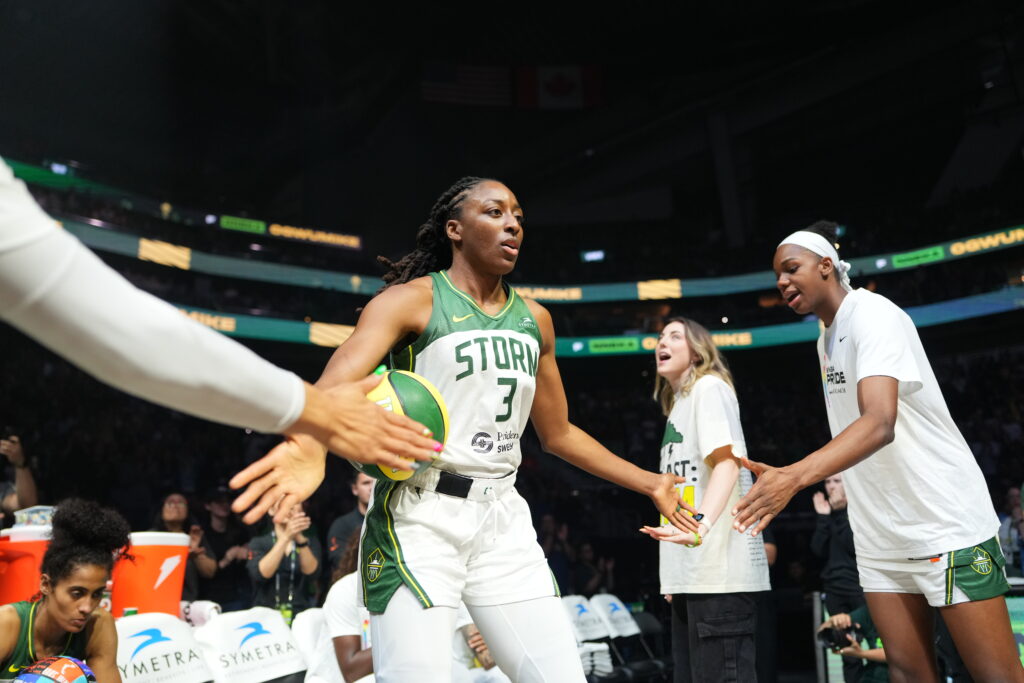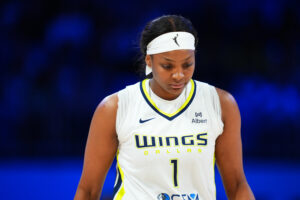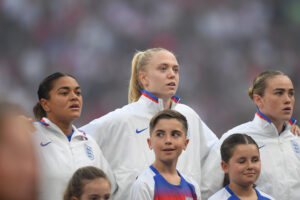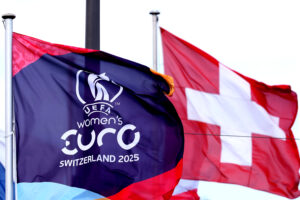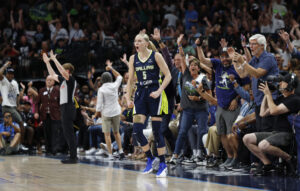Kristie Mewis calls me promptly at 12:00 p.m.
Right from “Hey, Rachel!,” it immediately feels like I’m catching up with an old friend. Perhaps it’s the familiarity of her slight Boston accent that reminds me we’re both east coasters. Or maybe it’s simply just who Mewis is: kind, reliable, real.
Both Mewis and her younger sister Sam, U.S. Soccer’s 2020 Player of the Year, were seemingly born to play sports. Their parents were both athletes, but though her mom played basketball, Mewis fell in love with soccer after picking up the sport when she was four or five years old.
“And then obviously having Sam growing up, and being able to play it with her, and share that with her, was a game changer.”
A SUDDEN ASCENT, THEN A GRADUAL FALL
Graduating from Boston College in 2013 as the school’s record holder for career points (116) and a three-time Hermann Trophy semifinalist, Mewis was drafted third overall in the 2013 NWSL College Draft by none other then current-USWNT coach Vlatko Andonovski, who was then at the helm of FC Kansas City.
Shortly thereafter, Mewis secured her first cap with the USWNT. Four months later, she scored her first international goal in a match against South Korea while playing at her hometown stadium in Foxborough, Massachusetts.
But after 15 caps with the best team in the world, Mewis’ career began to stall. A combination of factors, including the inability to find the right position, sidelined Mewis from the national team. At the club level, a game of NWSL hot potato tossed her between five clubs in five seasons, with Mewis finally landing in Houston with the Dash.
To top it all off, in May of 2018, just as she was beginning to find her footing in Texas, she tore her ACL in a match against the Washington Spirit. The injury brought Mewis’ career to a crossroads. Suddenly, a player who first scored for the national team when she was 22 hadn’t been called in for almost half a decade. And now having blown out her knee, no one would have been surprised had Mewis decided that enough was enough. It was game over and time to move on.
But instead of letting that injury knock her out of soccer, Mewis says it served as a “kick in the ass.”
“After I had the period of feeling bad for myself, I kind of took it as like, what are you doing? Like, let’s get back on track. Let’s do what you want with your career.”
THE LONG ROAD BACK
Some athletes will sugar coat their descent from the top. Mewis is matter-of-fact, but not harsh, in describing her journey from a standout youth (she was U.S. Soccer’s 2008 Young Female Athlete of the Year) to a pro having to fight through years of uncertainty.
“After I had gotten cut from the national team, I always wanted to be able to get back there,” she says, stating that after her injury, “I just told myself that I was going to come back better than ever. And I wasn’t going to settle for anything less. And that’s what I did.”

Mind over matter may have been the mantra, but that doesn’t mean it was easy. Serious injuries take a toll on both your body and the mind, and even the toughest athletes have to learn to manage their emotions throughout the process.
For Mewis, recovering from her ACL injury gave her the space to let those emotions out.
“I sometimes try to play the tough guy role like nothing affects me,” she says. “I feel like through that process, I wasn’t able to do that because it was such a physical and mental roller coaster.”
It was in working through these ups and downs, Mewis says, that she found her strength again.
“I found a little bit of power in being vulnerable and being a little bit weak sometimes. I think it kind of helped me get on the right track again.”
CHALLENGE EXTENDED, CHALLENGE ACCEPTED
Mewis’ track ran parallel to that of her team’s, and in pursuing her dream of getting called up to play for her country again, she also helped the Dash turn a page in the history book.
Though COVID-19 threatened to shutter the NWSL in 2020, the league successfully pulled off the first professional sports bubble, hosting an eight-team Challenge Cup tournament in Salt Lake City, Utah.
Going into the tournament, the Dash were considered long shots at best, having never won a major trophy as a club. The team played with a Texas-sized chip on their shoulder, and Mewis entered the bubble environment on a personal mission.
After seven starts in seven games and 558 minutes on the field, for the first time in her professional, she emerged a champion, having drawn a penalty in the title game which led to the opening goal.

“I think being able to celebrate something like that in such a difficult time, especially for a team who hasn’t had too much success in the past and me personally, haven’t had too much success in the NWSL, it was just really special,” she says.
The Cup also gave Mewis a chance to prove herself to one of the few outside individuals allowed in the bubble: USWNT coach Vlatko Andonovski, who throughout the tournament could be seen jotting down notes while sitting in the stands.
Mewis had been invited to a USWNT I.D. camp in December of 2019. There, her former coach was blunt in his assessment that she still had work to do to be considered for the team.
“One thing that I love about Vlatko is that he’s extremely honest,” Mewis says. “I went into that camp and I was playing left back, and I obviously hadn’t played there in a while. So I kind of got smacked in the face a bit playing defense. But I think his feedback was another wake up call for me.”
Andonovski’s assessment of her play didn’t deter Mewis, but instead kept her foot on the gas and sharpened her focus.
“I knew I could do better than that.”
ONE GOAL REACHED LEADS TO ANOTHER
This past November, the USWNT finally got back on the pitch after 261 days away, facing off against the Netherlands in a post-Thanksgiving rematch of the 2019 World Cup final. An added bonus for fans and one proud set of parents? A pair of Mewises in the midfield.
Not only was Kristie Mewis called back into camp, but she earned a spot on the 18-player roster for the game against the Dutch. In bringing her back into the team, Andonovski cited her 2020 club season, when Mewis followed up her Challenge Cup performance with two goals and five assists in the NWSL’s four-game Fall Series
Against the Netherlands, Mewis had to wait 61 minutes before getting her chance, a fraction of time for someone who’d already waited six years for her international return.
“When I was running on the field, I obviously hadn’t had a cap in so many years, I couldn’t help but laugh because just after so many years, me running onto that field again, and having Sam on the field, it was just awesome.”
Ten minutes later, with an assist from Lynn Williams, Mewis sprinted past her defender and powered the ball to the far-post and straight into the back of the net. Just like that, 2,722 days since her last USWNT goal (the longest span between goals in team history), Kristie Mewis had announced her return.
Welcome back! Kristie Mewis scores in her first game with @USWNT in 6 years ???? pic.twitter.com/axtVgrV0Yc
— espnW (@espnW) November 27, 2020
Mewis’ pure elation and palpable bliss were obvious to anyone watching.
“It was truly such a rewarding thing. I had wanted to be back on that field with that team for so long. It was definitely really special.”
The icing on the cake? Turning around and celebrating with Sam.
“It was the best feeling ever,” Mewis says. “I couldn’t have asked for it to go any better.”
Two months later, in the team’s first match against Colombia in January, Mewis added her name to the score sheet again in a game that included four goals, but only one surname. Sam Mewis notched her first international career hat trick that night to open the score 3-0. She then subbed out for Kristie, who in the 85’ minute made it 4-0 USA.
Finishing STRONG! @CarliLloyd with her second assist of the night, @KristieMewie with her second goal in as many games ???????? pic.twitter.com/8iu5fWPeaM
— U.S. Soccer WNT (@USWNT) January 19, 2021
Despite competing with each other as children, no one besides their parents (and even then it’s up for debate) is more proud of either sister than they are of each other.
“Sam just absolutely rocked that game,” Kristie says. “Not that she’s been overlooked in the past, but I think she’s been at the top of her game for a long time, and I’m so glad that it’s actually finally showing and she’s getting credit for it.”
Mewis knows how special it is to not only share the field with Sam, but fill up the stat sheet as well, saying, “It’s those memories that we’ll talk about and we’ll have for so long.”
Sam certainly shares in the sisterly pride. Talking to teammate Kelley O’Hara and JWS CEO Haley Rosen on the Just Women’s Sports podcast, she raved about having Kristie back with the team.
“Watching her success this summer and seeing how well she’s been doing ever since she came back from her knee, I’ve just been watching in amazement… Obviously we had a couple of chances to [play together] when we were younger, but I think understanding better now really what it takes to be there and to stay at that level has made it a lot more rewarding.”

LOOKING AHEAD TO 2021
s 2021 gets underway, Mewis has her eyes on the upcoming NWSL season and proving the Dash are here to stay. Having been in the league since its inaugural year, she is profoundly optimistic about the future of her sport.
“I feel like nine years ago when the NWSL was starting, it was still so fresh and so new. I’m kind of jealous that I can’t start over again, because I would love to come into the league right now.”
“It’s just so special to be a part of it and to see all these new teams coming in, the salaries rising, everything happening with it is just so exciting.”
It’s also no secret that the Olympics are on the horizon. Coach Andonovski is faced with the daunting task of selecting 18 players from a pool of more than two dozen world-class picks. The fact that Mewis is in serious contention for a coveted spot on the Tokyo roster is a testament to her dedication in turning her career around.
“I would obviously be so honored to be a part of that roster, but it is such a tight number with 18, so it will be very difficult,” she says. “But I’m going to do whatever I can to try to make that roster and just stay with the national team as long as I can and really make an impact there.”
“I’M NOT TAKING ANY OF IT FOR GRANTED”
Mewis and I talk about what it means for her to have made it all the way back, and to now be wearing the crest again after suffering a series of setbacks that few in the sport have ever come back from.
“I’m not taking any of it for granted,” she says. “Every training session, every game, every opportunity that I have to be able to play on that team and make an impact is so special. I think it feels even a little bit more special to me just because I haven’t been there in so long.”
This USWNT is and is not the same team Mewis last knew in 2014, having steadily grown in popularity and excellence. Since Mewis’ last stint, the team has won two World Cups while also entrenching itself in the zeitgeist of our progressive social era.
Mewis herself is both a familiar face and a new person, someone who has honed her craft during her six-year absence and, frankly speaking, grown up quite a bit. Thinking back to the start of her career with senior team, Mewis is quite honest about her maturity then versus where she is now.
“I first got called in with the national team when I was like 19, so I guess I just didn’t really have the knowledge to take it seriously as, ‘This is my career, everything that I do is going to affect my career,’” she says. “My professionalism is different now.”
Mewis also credits her time in both the NWSL and playing overseas with making her a wiser and more experienced player. Andonovski agrees, noting after November’s match that the Kristie Mewis of the past two years is a different player than the one he first drafted in 2013.
“First, off the field [she is] a little more committed and a little better pro, but then on the field with her play, with her performance, she showed she deserved to be around this group of players.”
Looking at who she was then, and who she is now, Mewis appreciates both the journey and its results.
“I do think that I’m a better player overall now than I was then,” she says. “I’m the fittest I’ve ever been, and I just feel more like a professional now. I think that the experience and the wisdom of being an older player really does go a long way.”
She doesn’t pretend to have a full understanding of the reality her Black teammates face, and in a moment of reflection, readily admits that “it’s been tough to realize how in the dark you have been your whole life.” But Mewis understands and embraces the responsibility to be proactive and not wait for her marginalized peers to show her the way.
“It is truly important to start the conversation,” she says. “Ask a question, read a book, listen to a podcast. Do anything. It’s just about starting it.”
THE NEXT CHAPTER FOR THE COMEBACK KID
Shortly after our call, Mewis is heading back into camp with the national team in order to prep for the SheBelieves Cup. The tournament will provide yet another chance for Mewis to show not just her teammates and her fans what she’s made of, but herself as well.
As McCaffrey notes, “I think when we see professional athletes significantly elevate their level of play later in their careers, we often look for more tangible answers about what they changed — their strength training, their diet, their technical training routine. But what is so amazing about how Kristie has elevated her game is that the one element she truly changed is her mentality.”
Simply put, Mewis is tenacity and grit personified. Her journey exemplifies the power of the mind over the experience of the body, inspiring others to rethink their limits.
“I think it’s really important to admit to yourself what you truly want,” Mewis says, “and do whatever you can to get back to that place. It’s so cliché, but you really can do whatever you set your mind to.”
